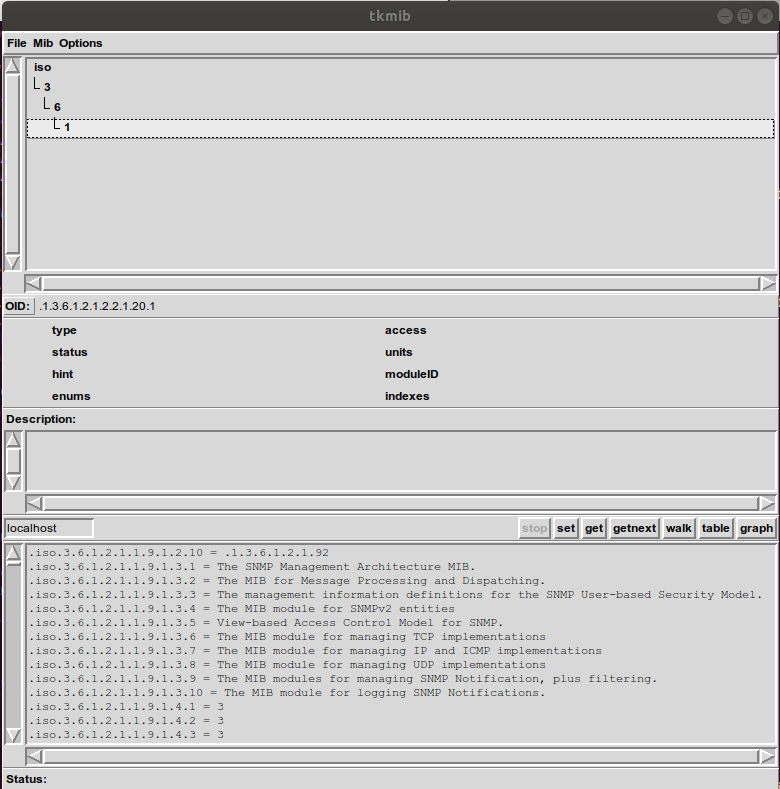SNMP or Simple Network Management Protocol, is a technology standard for alert messages (trap), monitoring (get), and configuring (set) network devices. SNMP comes in three varieties: v1, v2 and v3, of which v3 is the only version to be considered secure.
The variables associated with a network device configuration is defined in the Management Information Base, or MIB. The MIB is a collection of information for managing the network element and is comprised of managed objects identified by the Object Identifier (OID). Each OID is unique and identifies a special characteristic of the managed network device. SNMP is built upon a client (SNMP manager) - server (SNMP agent/network device) architecture pattern with a message schema defined by the MIB and sent over UDP port 161 (SNMP agent) and port 162 (SNMP manager). Each of the data values defined by the MIB are associated with an OID identified by a hierarchy of numbers separated by periods.
Installation:
- CentOS/RedHat: sudo yum install net-snmp-utils net-snmp net-snmp-devel
(RPMs also included with CentOS/RHEL 6 and 7 install DVDs) - Ubuntu: sudo apt-get install snmp snmpd snmp-mibs-downloader
Configure:
- System file /etc/snmp/snmpd.conf
This file default restricts access to localhost only. - User file ~/.snmp/snmp.conf
Start:
- CentOS/RedHat:
- sudo systemctl enable snmpd.service
- sudo systemctl start snmpd.service
- sudo systemctl status snmpd.service
snmpd.service - Simple Network Management Protocol (SNMP) Daemon. Loaded: loaded (/usr/lib/systemd/system/snmpd.service; enabled; vendor preset: disabled) Active: active (running) since Tue 2019-07-02 17:03:02 PDT; 3s ago Main PID: 345 (snmpd) Memory: 6.8M CGroup: /system.slice/snmpd.service └─345 /usr/sbin/snmpd -LS0-6d -f Jul 02 17:03:01 myhostname systemd[1]: Starting Simple Network Management Protocol (..... Jul 02 17:03:02 myhostname snmpd[345]: NET-SNMP version 5.7.2 Jul 02 17:03:02 myhostname systemd[1]: Started Simple Network Management Protocol (S..... Hint: Some lines were ellipsized, use -l to show in full.
- Ubuntu:
- sudo systemctl enable snmpd.service
- sudo systemctl start snmpd.service
- sudo systemctl status snmpd.service
Test:
- snmpwalk -v 1 localhost -c public .1.3.6.1
- snmpwalk -v 1 localhost -c public system
- Open firewall to everything (if using iptables): sudo iptables -F
or - if using firewald: sudo firewall-cmd --permanent --new-service=snmp
this command will add service to directory /etc/firewalld/services/
snmp 161/tcp # Simple Net Mgmt Proto snmp 161/udp # Simple Net Mgmt Proto snmptrap 162/tcp # SNMPTRAP snmptrap 162/udp snmp-trap # Traps for SNMP cmip-man 163/tcp # ISO mgmt over IP (CMOT)
- RHEL 7: snmpget -v 1 -c public localhost sysDescr.0
SNMPv2-MIB::sysDescr.0 = STRING: Linux myhostname 3.10.0-693.el7.x86_64 #1 SMP Thu Jul 6 19:56:57 EDT 2017 x86_64Ubuntu: snmpget -v 1 -c public localhost .1.3.6.1.2.1.1.1.0iso.3.6.1.2.1.1.1.0 = STRING: "Linux myhostname 4.15.0-70-generic #79-Ubuntu SMP Tue Nov 12 10:36:11 UTC 2019 x86_64" - RHEL 7: snmptranslate -Tp | less
+--iso(1) | +--org(3) | +--dod(6) | +--internet(1) | +--directory(1) | +--mgmt(2) | | | +--mib-2(1) | | | +--system(1) | | | | | +-- -R-- String sysDescr(1) | | | Textual Convention: DisplayString | | | Size: 0..255 | | +-- -R-- ObjID sysObjectID(2) | | +-- -R-- TimeTicks sysUpTime(3) | | | | | | | +--sysUpTimeInstance(0) | | | | | +-- -RW- String sysContact(4) | | | Textual Convention: DisplayString | | | Size: 0..255 ... ...MIB files have to be installed on your system so that it understands the schema hierarchy of the system you want to query.
- net-snmp-config --default-mibs --default-mibdirs
:HOST-RESOURCES-MIB:HOST-RESOURCES-TYPES:UCD-DISKIO-MIB:TCP-MIB:UDP-MIB:MTA-MIB:NETWORK-SERVICES-MIB:SCTP-MIB:RMON-MIB:EtherLike-MIB:LM-SENSORS-MIB:SNMPv2-MIB:IF-MIB:IP-MIB:NOTIFICATION-LOG-MIB:DISMAN-EVENT-MIB:DISMAN-SCHEDULE-MIB:UCD-SNMP-MIB:UCD-DEMO-MIB:SNMP-TARGET-MIB:NET-SNMP-AGENT-MIB:SNMP-MPD-MIB:SNMP-USER-BASED-SM-MIB:SNMP-FRAMEWORK-MIB:SNMP-VIEW-BASED-ACM-MIB:SNMP-COMMUNITY-MIB:IPV6-ICMP-MIB:IPV6-MIB:IPV6-TCP-MIB:IPV6-UDP-MIB:IP-FORWARD-MIB:NET-SNMP-PASS-MIB:NET-SNMP-EXTEND-MIB:UCD-DLMOD-MIB:SNMP-NOTIFICATION-MIB:SNMPv2-TM:NET-SNMP-VACM-MIB /home/userx/.snmp/mibs:/usr/share/snmp/mibsLook in /usr/share/snmp/mibs/ for a full list of system MIB files.
- Print table: snmptable -v 1 -c public localhost sysORTable
(CentOS/RHEL only) - Print system uptime: snmpget -v 1 localhost -c public .1.3.6.1.2.1.1.3.0
iso.3.6.1.2.1.1.3.0 = Timeticks: (1310658) 3:38:26.58 - Print CPU 15 minute load: snmpget -v 1 localhost -c public .1.3.6.1.4.1.2021.10.1.3.3
iso.3.6.1.4.1.2021.10.1.3.3 = STRING: "0.10"
| Command | Description |
|---|---|
| snmpcmd | options and behavior common to most of the Net-SNMP command-line tools |
| snmpwalk | retrieve a subtree of management values using SNMP GETNEXT requests |
| snmpget | communicates with a network entity using SNMP GET requests |
| snmpset | communicates with a network entity using SNMP SET requests |
| snmptrap | sends an SNMP notification to a manager (also snmpinform) |
| snmpgetnext | communicates with a network entity using SNMP GETNEXT requests to get the next variable that is lexicographically "next" in the remote entity's MIB |
| snmptable | retrieve an SNMP table and display it in tabular form |
| snmpdelta | Monitor delta differences in SNMP Counter values |
| snmptest | flexible SNMP application that can monitor and manage information on a network entity |
| snmpdf | display disk space usage on a network entity via SNMP |
| snmpusm | creates and maintains SNMPv3 users on a network entity |
| snmpstatus | retrieves a fixed set of management information from a network entity |
| snmpnetstat | display networking status and configuration information from a network entity via SNMP |
| snmpbulkget | SNMP application that uses the SNMP GETBULK request to query a network entity efficiently for information |
| snmpbulkwalk | retrieve a subtree of management values using SNMP GETBULK requests |
| snmp.conf | configuration files for the Net-SNMP applications |
| SNMP Variables | Format of specifying variable names to SNMP tools |
The Object Identifiers (OID)s are used to identify a specific characteristic of a managed device.
There are two types of Managed OIDs:- Scalar: managed object with a single instance (a single key to a key-value pair)
- Tabular: multiple data instances such as the rows of a table (e.g. CPU with multiple cores each with its' own specific charateristics)
SNMP uses ASN.1 (Abstract Syntax Notation One) to define the data types used to build an SNMP message and uses Basic Encoding Rules (BER) to define the data types.
Two data types each with multiple sub-types:- Primitive Type: type/length(bytes)/data
- integer
- octet (byte, char)
- string
- null
- boolean
- OID
- Complex Type: type/length/(type/length/data)(type/length/data)
- sequence
- SNMP PDU (Protocol Data Unit) - complex data types specific to SNMP
| OID | Description |
|---|---|
| CPU Statistics | |
| .1.3.6.1.4.1.2021.10.1.3.1 | Load 1 minute |
| .1.3.6.1.4.1.2021.10.1.3.2 | Load 5 minute |
| .1.3.6.1.4.1.2021.10.1.3.3 | Load 15 minute |
| .1.3.6.1.4.1.2021.11.9.0 | percentage of user CPU time |
| .1.3.6.1.4.1.2021.11.50.0 | raw user cpu time |
| .1.3.6.1.4.1.2021.11.10.0 | percentages of system CPU time |
| .1.3.6.1.4.1.2021.11.52.0 | raw system cpu time |
| .1.3.6.1.4.1.2021.11.11.0 | percentages of idle CPU time |
| .1.3.6.1.4.1.2021.11.53.0 | raw idle cpu time |
| .1.3.6.1.4.1.2021.11.51.0 | raw nice cpu time |
| Memory Statistics | |
| .1.3.6.1.4.1.2021.4.3.0 | Total Swap Size |
| .1.3.6.1.4.1.2021.4.4.0 | Available Swap Space |
| .1.3.6.1.4.1.2021.4.5.0 | Total RAM in machine |
| .1.3.6.1.4.1.2021.4.6.0 | Total RAM used |
| .1.3.6.1.4.1.2021.4.11.0 | Total RAM Free |
| .1.3.6.1.4.1.2021.4.13.0 | Total RAM Shared |
| .1.3.6.1.4.1.2021.4.14.0 | Total RAM Buffered |
| .1.3.6.1.4.1.2021.4.15.0 | Total Cached Memory |
| Disk Statistics | |
| .1.3.6.1.4.1.2021.9.1.2.1 | Disk path where disk is mounted |
| .1.3.6.1.4.1.2021.9.1.3.1 | Path of the device for the partition |
| .1.3.6.1.4.1.2021.9.1.6.1 | Total size of the disk/partition (kBytes) |
| .1.3.6.1.4.1.2021.9.1.7.1 | Available space on the disk |
| .1.3.6.1.4.1.2021.9.1.8.1 | Used space on the disk |
| .1.3.6.1.4.1.2021.9.1.9.1 | Percentage of space used on disk |
| .1.3.6.1.4.1.2021.9.1.10.1 | Percentage of inodes used on disk |
| System Statistics | |
| .1.3.6.1.2.1.1.3.0 | System uptime |
| .1.3.6.1.2.1.1.5.0 | Host name |
Installation:
- CentOS/RedHat: sudo yum install net-snmp-gui
(uses EPEL repository) - Ubuntu: sudo apt-get install tkmib
Run: tkmib localhost

Select the "walk" button to traverse the OIDs.
| Acronym | Description |
|---|---|
| ASN.1 | Abstract Syntax Notation One |
| BER | Basic Encoding Rules |
| MIB | Management Information Base (data schema for an SNMP device and its variables) |
| OID | Object Identifiers (period separated number notation used to define the SNMP device variables) |
| PDU | Protocol Data Unit (SNMP packet construction definition) |
| SNMP | Simple Network Management Protocol |
 |
Net-SNMP On CentOS 7.x
by Steven Cortright Kindle ebook
|

|


 Books:
Books: